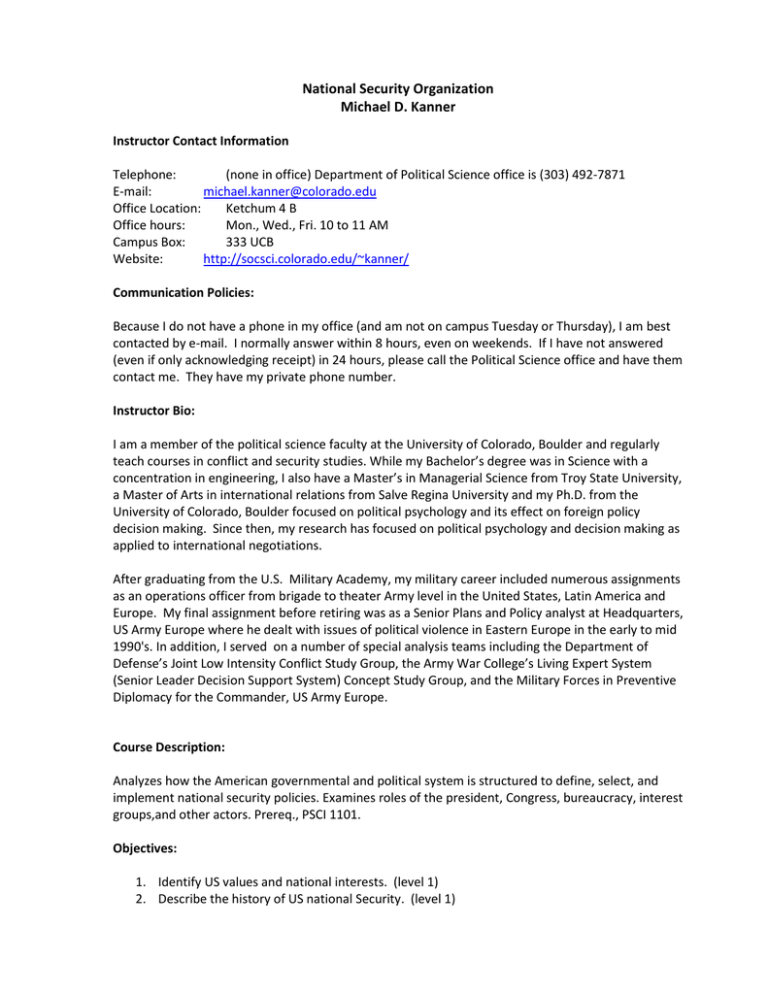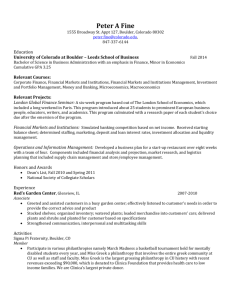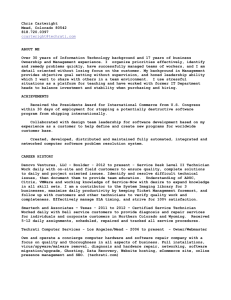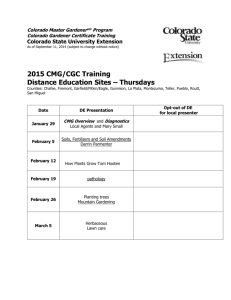
National Security Organization
Michael D. Kanner
Instructor Contact Information
Telephone:
(none in office) Department of Political Science office is (303) 492-7871
E-mail:
michael.kanner@colorado.edu
Office Location:
Ketchum 4 B
Office hours:
Mon., Wed., Fri. 10 to 11 AM
Campus Box:
333 UCB
Website:
http://socsci.colorado.edu/~kanner/
Communication Policies:
Because I do not have a phone in my office (and am not on campus Tuesday or Thursday), I am best
contacted by e-mail. I normally answer within 8 hours, even on weekends. If I have not answered
(even if only acknowledging receipt) in 24 hours, please call the Political Science office and have them
contact me. They have my private phone number.
Instructor Bio:
I am a member of the political science faculty at the University of Colorado, Boulder and regularly
teach courses in conflict and security studies. While my Bachelor’s degree was in Science with a
concentration in engineering, I also have a Master’s in Managerial Science from Troy State University,
a Master of Arts in international relations from Salve Regina University and my Ph.D. from the
University of Colorado, Boulder focused on political psychology and its effect on foreign policy
decision making. Since then, my research has focused on political psychology and decision making as
applied to international negotiations.
After graduating from the U.S. Military Academy, my military career included numerous assignments
as an operations officer from brigade to theater Army level in the United States, Latin America and
Europe. My final assignment before retiring was as a Senior Plans and Policy analyst at Headquarters,
US Army Europe where he dealt with issues of political violence in Eastern Europe in the early to mid
1990's. In addition, I served on a number of special analysis teams including the Department of
Defense’s Joint Low Intensity Conflict Study Group, the Army War College’s Living Expert System
(Senior Leader Decision Support System) Concept Study Group, and the Military Forces in Preventive
Diplomacy for the Commander, US Army Europe.
Course Description:
Analyzes how the American governmental and political system is structured to define, select, and
implement national security policies. Examines roles of the president, Congress, bureaucracy, interest
groups,and other actors. Prereq., PSCI 1101.
Objectives:
1. Identify US values and national interests. (level 1)
2. Describe the history of US national Security. (level 1)
3. Define the key elements of the current security environment. (level 1)
4. Name the significant actors in security policy and explain how they interact. (level 1 and 2)
5. Examine the influence of domestic politics and interests on security policy and be able to
demonstrate this influence for a specific group. (level 3 and 4)
6. Examine the new security challenges and explain the effect on national security policy. (level
4 and 5)
7. Explain the long term security issues facing the United States and compare them to earlier
threats (level 5 and 6)
Overview:
In addition to assigned readings, students will participate in on-line discussions similar to the
discussions I use while teaching in a face-to-face format. Discussions will be centered on a key
question relating readings to the objectives above. Videos may be used as introductions or to initiate
discussions (e.g., summarizing a recent event). I have successfully used this technique in the past
with similar courses (PSCI 3163-581).
Students will also conduct a research project to demonstrate their ability to apply the concepts that
will be discussed. The project, a staff study, is discussed below.
Course Outline:
Lesson
1.
2.
3.
4.
5.
6.
7.
8.
9.
10.
11.
Reading
Module 1. Introduction (objective 1)
What are US national interests?
USN, Ch. 1
How has US history influenced its current national
USN, Ch. 2,
security position?
NSNE, Ch. 4
Module 2. Context (objective 2)
What are the new challenges to U.S. national security? NSNE, Ch. 2
How has globalization influenced national security
NSNE, Ch. 6
goals and policy?
Module 3. National Security System (objective 3, 4)
What are the security role and powers of the
USN, Ch., 4
presidency?
How does the NSC operate?
USN, Ch. 5
What is the significance of the relationship between
USN, Ch. 6 and 7
the military and civilian leadership?
What is the proper role for the intelligence
USN, Ch. 8
community?
Module 4. Security Process (objective 4, 5, 6)
How do congress and the president work to develop
USN, Ch. 9 and
and implement security policy?
10
How does the security system react to domestic and
USN, Ch. 11 and
international input?
12
Module 5. New Challenges (Objective 6, 7)
How has the changing face of conflict affected security NSNE, Ch. 11,
Suggested Due Date
in order to stay on
track
January 18
February 1
Take Module Exam
February 8
February 15
Take Module Exam
February 22
March 1
March 15
March 22
Take Module Exam
April 5
April 12
Take Module Exam
April 19
policy?
12. What are the long term challenges to national
security?
13. What problems do you see in the current system and
how might they be fixed?
12, 13
USN, Ch. 13
April 26
USN, Ch. 15
May 3
Take Module Exam
All work must be done by midnight on May 3, 2013.
Required Texts:
Sarkesian, Sam C.; John Allen Williams, and Stephen J. Cimbala. 2012. US National Security:
Policymakers, Processes, and Politics, 5th Edition. Boulder, CO.: Lynne Rienner Publishers.
Snow, Donald. 2010. National Security for a New Era, 4th Edition. New York: Pearson-Longman.
Student Responsibilities:
Students are expected to do all of the assigned readings. In cases where additional readings or
videos are part of a discussion question, students are expected to read or view before posting their
response.
In addition to doing the assigned readings, students will participate in the on-line discussions.
Participation consists of posting their responses and their reaction to the postings o other students.
When a posting has resulted in a question from Dr. Kanner, they need to respond that that question
as well.
Each module is followed by an exam on that section. These exams will consist of short essays about
the major questions within the module.
Students will write a staff study to demonstrate their ability to analyze a clearly defined security
problem of their own choice and to identify major elements of the problem. Studies will be 5 to 8
pages and include discussions of relevant facts and assumptions along with a policy recommendation.
Grading Criteria:
Grades are based on a scale of 100 points. Your final grade will be a function of the number of points
that you achieve.
A
A-
94-100
90-93
B+
B
B-
87-89
83-86
80-82
Points are allocated based on the following:
Module exams (5) – 15 points each
Staff Study
On-line participation
Total
C+
C
C-
77-79
73-76
70-72
75 points
15 points
10 points
100 points
D+
D
D-
67-69
63-66
60-62
F
0-59
Module exams. These should be taken at the conclusion of each module. Module exams will consist
of two to three short essays related to the key questions in that module. All module exams must be
completed no later than the May 3, 2013.
Staff Study (additional specific instructions to be posted). The staff study is used by government
agencies to analyze problems. It involves defining the problem, making assumptions, drawing
conclusions and making recommendations. Your final study will be based on the following criteria:
• Assumptions
o Were they valid?
o Did they serve to limit or organize the analysis?
o Did they address –
• the nature of the problem,
• the amount of resources available
• the problem’s significance
• the criteria for selection of a solution
• Facts
o Did they relate directly to the problem?
o Were they from credible resources?
• Discussion and conclusion
o Did you explain the issue?
o Did you establish a set of criteria against which courses of action are judged?
o Did you present possible solutions?
o Did you compare the solutions to the criteria?
o Did you make a single recommendation?
• Writing
o Was the format followed?
o Did spelling and grammar detract from the argument?
On-Line Participation. Discussions on the DESIRE2LEARN (D2L) Forum List are in lieu of classroom
discussions. You should post your thoughts on the questions and comments of other students. If I
respond to your posting with a question, you should answer the question.
Just as you need to be on time for classes, you should participate in the discussions in a timely
manner. That is why grades for each post will only be given full credit (1 points) if they are prior to
the suggested completion date for the module. You will be given partial credit (1/2 point) for a week
after that. POSTINGS AFTER THAT WEEK WILL NOT BE GIVEN ANY CREDIT.
Submission Policies:
Module exams are available on D2L. You should make sure that you have a good internet connection
before starting the exam because dropped service can result in losing your work.
The staff study will be sent to the DROPBOX folder STUDY on the D2L website. Copies should also be
e-mailed in WORD compatible format to Dr. Kanner at michael.kanner@colorado.edu.
Course Plagiarism Policy:
Plagiarism is defined as “portrayal of another’s work or ideas as one’s own”
(http://honorcode.colorado.edu/about-honor-code/definitions) and will not be tolerated in this
course. Violations will result in an F for the course.
Standard Campus Syllabi Requirements
Notice for students with disabilities:
If you qualify for accommodations because of a disability, please submit a letter from Disability
Services in a timely manner so that your needs may be addressed.
(1) The Boulder Provost's Disability Task Force recommended syllabus statement:
If you qualify for accommodations because of a disability, please submit to me a letter from Disability
Services in a timely manner so that your needs be addressed. Disability Services determines
accommodations based on documented disabilities. Contact: 303-492-8671, Willard 322, and
www.Colorado.EDU/disabilityservices
Disability Services' letters for students with disabilities indicate legally mandated reasonable
accommodations. The syllabus statements and answers to Frequently Asked Questions can be found
at
www.colorado.edu/disabilityservices
(2) It is the responsibility of every instructor to clearly explain his or her procedures about absences
due to religious observances in the course syllabus so that all students are fully informed, in writing,
near the beginning of each semester's classes. Campus policy regarding religious observances states
that faculty must make reasonable accommodation for them and in so doing, be careful not to inhibit
or penalize those students who are exercising their rights to religious observance. Faculty should be
aware that a given religious holiday may be observed with very different levels of attentiveness by
different members of the same religious group and thus may require careful consideration to the
particulars of each individual case. See http://www.colorado.edu/policies/fac_relig.html
Observance of Religious Holidays
Campus policy regarding religious observances requires that faculty make every effort to deal
reasonably and fairly with all students who, because of religious obligations, have conflicts with
scheduled exams, assignments or required attendance. Because of this being an on-line course, this
should not be an issue, however, please contact me as soon as possible if it will be. See full details at
http://www.colorado.edu/policies/fac_relig.html
A comprehensive calendar of the religious holidays most commonly observed by
CU-Boulder students is at http://www.interfaithcalendar.org/
Online Classroom Behavior Policies
Students and faculty each have responsibility for maintaining an appropriate learning environment.
Those who fail to adhere to such behavioral standards may be subject to discipline. Professional
courtesy and sensitivity are especially important with respect to individuals and topics dealing with
differences of race, culture, religion, politics, sexual orientation, gender, gender variance, and
nationalities. Class rosters are provided to the instructor with the student's legal name. I will gladly
honor your request to address you by an alternate name or gender pronoun. Please advise me of this
preference early in the semester so that I may make appropriate changes to my records. See policies
at http://www.colorado.edu/policies/classbehavior.html and at
http://www.colorado.edu/studentaffairs/judicialaffairs/code.html#student_code
Discrimination and Harassment Policies
The University of Colorado at Boulder policy on Discrimination and Harassment, the University of
Colorado policy on Sexual Harassment and the University of Colorado policy on Amorous
Relationships apply to all students, staff and faculty. Any student, staff or faculty member who
believes s/he has been the subject of discrimination or harassment based upon race, color, national
origin, sex, age, disability, religion, sexual orientation, or veteran status should contact the Office of
Discrimination and Harassment (ODH) at 303-492-2127 or the Office of Judicial Affairs at 303-4925550. Information about the ODH, the above referenced policies and the campus resources available
to assist individuals regarding discrimination or harassment can be obtained at
http://www.colorado.edu/odh
Honor Code Policies
All students of the University of Colorado at Boulder are responsible for knowing and adhering to the
academic integrity policy of this institution. Violations of this policy may include: cheating, plagiarism,
aid of academic dishonesty, fabrication, lying, bribery, and threatening behavior. All incidents of
academic misconduct shall be reported to the Honor Code Council (honor@colorado.edu; 303-7352273).
Students who are found to be in violation of the academic integrity policy will be subject to both
academic sanctions from the faculty member and non-academic sanctions (including but
not limited to university probation, suspension, or expulsion). Other information on the Honor Code
can be found at http://www.colorado.edu/policies/honor.html and at
http://www.colorado.edu/academics/honorcode/






